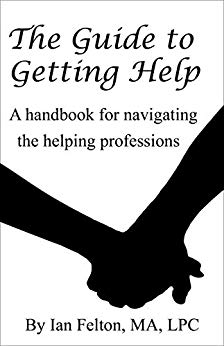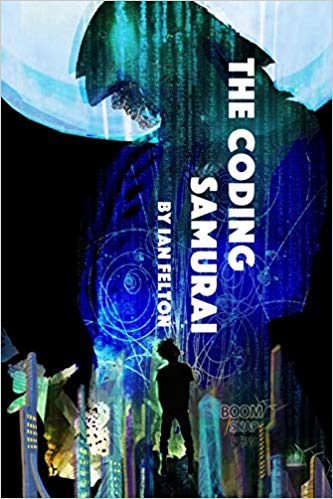Please introduce yourself and your book(s)!
My name is Ian Felton. I worked as a software developer for decades for organizations like Mayo Clinic, NASA, Best Buy, and more. But let’s just say I wasn’t a good fit for corporate America. My first book, The Coding Samurai: The Way of the Computer Warrior, reflects that. It’s a sci-fi thriller set in a near-future world with a protagonist intern working for a corrupt marketing company on a quantum computing software project. It also weaves in samurai historical fiction. Once I realized how square-peg-in-round-hole I was with the whole working for big organizations (my mission in life is easing human suffering not exploiting “human resources” for personal gain), I went back to school and became a psychotherapist (visit my website at https://www.ianfelton.com). My second book, The Guide to Getting Help: A Handbook for Navigating the Mental Health Professions, reflects that. It’s a non-fiction reference, designed to help those seeking mental health services by reducing stigma and hopefully providing a roadmap to answer many common questions about the practical concerns of seeking therapy.

https://www.goodreads.com/book/show/47109841-the-guide-to-getting-help
What is/are the real-life story(ies) behind your book(s)?
Having worked in the software industry for decades, I had thousands of experiences working in corporate America and navigating the transparent hypocrisy and inhumanness of it. The Coding Samurai drew upon these experiences as well as my love of eastern philosophy and martial arts (and marital arts). My second book was inspired by entering the mental health field and realizing that while tens of thousands of self-help books have been written (or more?) there was no clear guide book for helping to demystify and to use actual mental health services. It was truly mind-boggling that a book like it didn’t exist.

https://www.goodreads.com/book/show/34861982-the-coding-samurai
What inspires/inspired your creativity?
Just the sheer absurdity and absolute wonder of existence. Being alive is something I will never quite get over. Being a writer, psychotherapist, musician, photographer, and traveler are all ways of engaging my creativity. Every day I’m wrapped up in attempting to process that which can never really be made sense of and being creative is a huge part of that.
How do you deal with creative block?
To date, this isn’t something I’ve experienced. I always have way more ideas than time.
What are the biggest mistakes you can make in a book?
Self-absorbed, naval-gazing is the worst stuff out there. I believe not writing for your readers is the biggest mistake. If you’re writing for yourself, it’s probably not going to be very fun for someone else to read. That doesn’t mean the writer isn’t getting anything out of it—of course they are. The other mistakes are not following some writing and editing process that involves lots of feedback, rework, stepping away from the manuscript for a period time, etc. If you think your first, second, or third draft is good enough and don’t use one or more editors, you’re making a big mistake.
Do you have tips on choosing titles and covers?
I looked for local art students who just graduated and were trying to get their careers going. I was really lucky and found Dream Chen, a talented artist who gave my first book the exact cover it needed. The title is your first chance to get someone’s attention, so it needs to stand out, but also be succinct. There’s lots of conflicting opinions on titles so try to put a few in front of people and ask them which ones stand out. I spent a lot of time coming up with the title for The Coding Samurai. In the early stages of the process, I had a lot of questions about my book, but the title wasn’t one of them. I went to a writer’s workshop and was told I should change the title from The Coding Samurai to something else. I spent the night coming up with a new one that I now don’t even remember. When I went in front of a guest publisher the next day and we got to the title, he looked at me and said, “I think a better title would be The Coding Samurai.”
How do bad reviews and negative feedback affect you and how do you deal with them?
It’s not too hard to discern quality feedback from nonsense. When it’s clear someone has read my book and has something constructive to tell me, I listen and learn. When someone is just being cranky or clearly hasn’t read the book carefully, I can overlook it and move on. Look at all the books on Goodreads or Amazon that are amazing books with plenty of one and two-star reviews.
How has your creation process improved over time?
It’s more focused and I trust my vision more.
What were the best, worst and most surprising things you encountered during the entire process of completing your book(s)?
The worst and most surprising thing I encountered was how bad my first draft would be. I mean, the first draft was terrible. The best part was seeing it finally finished, physically in my hands and feeling really happy with the final product.
Do you tend towards personal satisfaction or aim to serve your readers? Do you balance the two and how?
I think my other answer gets into this a bit. You have to write a book for someone to read. It doesn’t have to have mass appeal, but you still have to have some type of people in mind who you want to get something from your book. If you just want to see your thoughts on paper, don’t publish it.
What role do emotions play in creativity?
A lot. I’m a psychotherapist and emotional content has to be present to find writing engaging. Unless you’re a technical writer, or writing something like my second book, sentences that aren’t inspired by emotion won’t be very entertaining or persuasive. Aristotle figured out a long time ago that if you want to persuade people, you need to fill your sentences up with emotion and also logic.
Do you have any creativity tricks?
Sit in a park, be quiet, and take in the beauty of the world.
What are your plans for future books?
I’m five chapters in to the follow-up to The Coding Samurai. After that, or possibly before, I’ll also be working on a book related to my psychotherapy practice and ongoing study of what it means to be a human. I’m leaning toward another book with software developers in mind, but relating to mental health.
Tell us some quirky facts about yourself
This one is difficult. At first, I could only come up with self-deprecating body-centered stuff that would embarrass my girlfriend if I put it in print. I’m not sure how much of the following is quirky, but I’ll take a shot. In college, I was in a band that was supposed to open up for K.C. and the Sunshine Band in Nippert Stadium in Cincinnati. A lightning storm came through after we played and so they couldn’t perform. Because of that we ended up being the headliner. I study Chinese language and martial arts. I know about 2000 Chinese characters and practice taiji, xingyi, and bagua. I love doing wildlife photography with my “life sentence,” Jen (this is her term so I won’t get in trouble). We’ve been to all kinds of little known (and some well-known) places to photograph animals like lemurs, polar bears, marmosets, mountain gorillas, and more. I’m a huge fan of ACT (Acceptance and Commitment Therapy) and it’s originator, Steven C. Hayes.